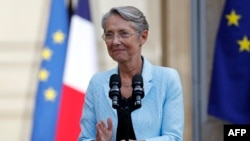France’s newly appointed prime minister Elisabeth Borne begins work this week with major challenges on her plate, tasked to rebrand President Emmanuel Macron’s second term with greener, more socially friendly policies — and to ensure his party wins next month’s legislative vote.
Borne is expected to name her new Cabinet this week. Then comes putting her boss’s goals for a new and different second term into practice.
Since President Emmanuel Macron announced her appointment as his new prime minister Monday evening, Borne has called for faster, stronger action on climate and the environment — and for garnering a majority as large as possible in June’s parliamentary elections.
Women’s rights activists hail the choice of the 61-year-old Borne as about time. That includes Edith Cresson, France’s last and only other female prime minister, who served more than 30 years ago. She told France’s BFMTV Borne’s appointment was a good choice.
But Macron’s main rival and another female political leader — the far right's Marine Le Pen — predicted Borne would continue the president’s policies of what she called state destruction and social pillaging. Communist leader Fabien Roussel described Borne as a French Margaret Thatcher, referring to Britain’s tough conservative prime minister in the 1980s.
And there was more criticism from far-left politician Jean-Luc Melenchon, who advised Borne not to unpack her bags too quickly. Melenchon hopes his leftist umbrella party will win the majority of legislative seats next month, forcing Macron to choose him as the next prime minister.
Described as a technocrat and Macron loyalist with socialist leanings, Borne ticks many of the boxes France’s president was seeking, as he hopes to woo leftist voters ahead of the legislative elections. She served as minister of environment and labor in Macron’s first term — but she has never been elected to office. That may change, as Borne is running for a legislative seat in Normandy’s Calvados department.
Former Greens party politician Cecile Duflot, who now heads the charity Oxfam France, told French radio that Borne was a hard worker and courageous on some environmental fights. But she also questioned how much leeway the new prime minister will have under Macron — whom environmentalists criticize as favoring talk over action, especially on climate change.
Meanwhile union leaders, who held difficult labor reform talks with Borne when she was minister, describe her as tough and uncompromising.
Still many people say Borne’s appointment is a sea-change for France, where young people have never known a female prime minister. She joins eight other women in the European Union who are currently either heads of state or government.







